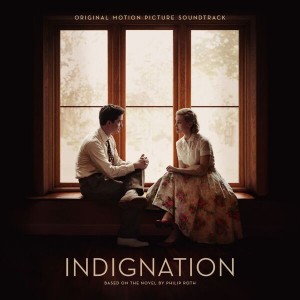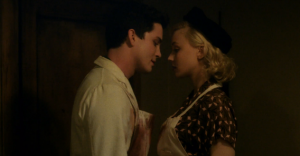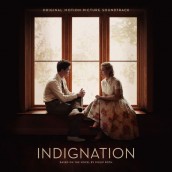
INDIGNATION soundtrack | ©2016 Nettwerk Records
A time capsule in many, almost outrageous respects, INDIGNATION takes us back to 1951, a year when youths went to college for a stringent education, as opposed to schooling themselves with beer and girls. The decade’s beginning was also marked by a “police action” in Korea and a home front war against sex, whose acts taken with utter casualness now could result in social shaming, or far worse back in The Day. It’s into this Puritanical environment of higher learning that the intellectually strident Marcus (Logan Lerman) tries to find himself at a college in Cleveland, rebelling against his provincially Jewish upbringing in the big New York borough city. At first choosing to entomb himself in a world of books, Marcus’ social isolation is breached by his attraction to Olivia Hutton (Sarah Gadon), a gorgeous WASP who proves to be his intellectual, if not mentally stable equal.
INDIGNATION‘s adaption from the novel by Philip Roth (THE HUMAN STAIN) is the stuff of high-toned tragic romance and verbal parlaying that marks melancholy, a lyrical feeling impressively realized by Jay Wadley. A Yale grad himself, Wadley’s background includes the far more lowbrow humor of COLLEGE HUMOR ORIGINALS, the dramatic series LIE TO ME and THE NINE LIVES OF CHLOE KING and the documentaries FAIR CHASE and WE LIVE THIS. Now his heartbreaking, thematic melodies serve as an impressive introduction to Wadley’s classically attuned talents that have seen his music commissioned by the Carnegie Hall Ensemble, the Louisville Symphony Orchestra and Rufus Wainwright for his Opera and Song Cycle. Employing a chamber approach for violin and piano, Wadley reaches into Marcus’ hungry, yet shut-off mind to poignantly reflect his emptiness. But there is a tenderness as well to be discovered as well in Olivia, with sharply trembling, string lines reaching into a mental instability she masks with utter, deceptive poise.
With more rhythmic, fuller orchestral passages moving the film along with an inexorable feeling of fate, Wadley’s strikingly intimate and melodic score brings humanity to characters who’ve shut themselves off from feeling at a perilously young age. It’s an intellectual musical approach that reaches into a memorably melodic wellspring of universal emotion, matching the gauzy lensing of longtime producer, and first time director James Schamus, and Oscar nominee for overseeing CROUCHING TIGER HIDDEN DRAGON and BROKEBACK MOUNTAIN, Wadley also dives into the INDIGNATION‘s time frame in crafting the resoundingly lush song “Is it Love,” with features Jane Monheit’s gorgeous voice as exactly the crooner you’d imagine when parking a borrowed car for some pre-curfew intimacy. With his own composing signature given it’s first Hollywood feature, Wadley’s poetically heartbreaking music is likely to create its own poetic swoon in speaking volumes for the time-honored genre of tormented romance.
ASSIGNMENT X: You could be described as one of those “come from nowhere” composers with this score. Could you tell us about your musical background?
JAY WADLEY: I grew up in Oklahoma taking piano lessons as well as playing drums, singing in, and writing songs for my punk rock band. I took voice lessons in high school and was in the All-State choir which exposed me to living choral composers who were experimenting with sonorities that challenged my perceptions of classical music. I was so inspired by that music that I purchased a basic version of Cakewalk so I could notate using midi and eventually completed my first choir piece. I organized around 40 choir friends to perform it at my school’s talent show senior year and from the moment I walked off stage, I knew I was going to be a composer.
I went to Oklahoma City University where I majored in classical composition with a minor in vocal performance. My professor, Edward Knight, was a former student of John Corigliano’s and was instrumental in helping me begin to develop my own voice and fundamental process of composition. I then attended the Yale School of Music where I received a Masters and Artist Diploma in composition while working in the Center for Studies in Music Technology engineering recordings and diving into production. I was lucky enough to study with Martin Bresnick, Aaron Jay Kernis and the late Ezra Laderman. I will forever be grateful to them for taking a chance on a wide eyed kid from Oklahoma. After graduation I stuck around Yale to teach and work in the studio but had interests in getting into film and TV music. Through a composer friend in LA, I had the opportunity to demo for an additional composer job which turned out to be LIE TO ME on FOX. Composing on that season was the first time I’d ever scored to picture and I was thrown into the fire of hour long network TV drama deadlines. It was super intense but I learned so much about working efficiently to turn around a lot of music on a tight deadline. After that I spent a few years helping Rufus Wainwright orchestrate his opera and song cycle, further honing my orchestration skills as I slowly continued growing my music production company, Found Objects, with my friend and fellow composer, Trevor Gureckis.
AX: How did your background doing such diverse work as shorts for COLLEGE HUMOR and series like LIE TO ME prepared you to take on a super-serious movie like “Indignation?” And what was it about your work that appealed to James Schamus?
WADLEY: Funnily enough, those projects were initially more foreign to me than the work I did with James on INDIGNATION. LIE TO ME taught me the mechanics like how to produce, score to picture, deliver on tight deadlines, take lots of notes and how not to sleep. With College Humor, whether it required me to produce/sing my best impression of Nickelback for LOOK AT THIS INSTAGRAM or write psychotically happy toy advertisement music for animations like HOVERBOARD LIGHTSABER PORTAL GUN FIGHT. I viewed every project as an opportunity to do research and expand my musical vocabulary.
With James, I was initially brought in to score his comedic short doc, THAT FILM ABOUT MONEY for Morgan Spurlock’s WE THE ECONOMY series. That was about 2 years ago now, but I think we spent a lot of that initial meeting just chatting about classical music and Rufus Wainwright. We had a really great time collaborating on that project and getting to know each other. 6 months or so later he gave me a ring asking if I would be interested in working on INDIGNATION. My experience on the other projects gave me practical tools and adaptability but it was my passion for classical composition and training that I think he found fitting and what allowed me to dive into the seriousness that a film like “Indignation” demands.
AX: Given that this was James Schamus’ directing debut after producing so many prestigious films, was there an extra sense of striving on his part to make INDIGNATION stand out?
WADLEY: James is a man with incredible intuitions, a wealth of knowledge and is a consummate collaborator. He invited me to peer into his process along the way from reading the script, visiting set, sitting in on edits/color etc… His thoroughness, experience and clear directorial perspective was evident from the performances and beautiful shot framing to his diligent placement of music cues. It was a pleasure to watch as he treated everyone with the type of respect and kindness that inspired and expected them to do their very best work. He had strong concepts he would stand up for when he knew they were right. If something wasn’t working, he encouraged experimentation until we found what we were looking for. Some of our favorite musical moments emerged when we stripped everything away and tried something entirely new and different. It might have been his first time in the director’s chair, but James is an experienced and creative leader who I think allowed his work and perspective to materialize very naturally.
AX: James has overseen such memorable scores as Mychael Danna’s THE ICE STORM and Tan Dun’s Oscar-winning CROUCHING TIGER, HIDDEN DRAGON. What musical lessons was he able to impart to you?
WADLEY: James often stressed the importance of melody and thematic development so as not to fall into the trap of meandering film score filler. He wanted the score to be simple but have substance. Cues needed a reason to be there and needed to be deliberate in the way they entered and exited. It was a structured and thoughtful approach to the creative process that I’m very grateful to have experienced with him. James always came to the table having done his research and took a lot of care in making his creative decisions. I learned a lot from just watching that.

INDIGNATION composer Jay Wadley | ©2016 Jay Wadley
AX: Were there composers, or scores that were an influence on INDIGNATION?
WADLEY: Yes, but James had a brilliant way of leading me places without explicitly referencing one composer or score too soon. He wanted me to arrive at a conclusion of my own. After reading the script, I wrote a six-minute exploration on the instrumentation and themes. They ended up temping that in a few spots in the film and it became our first “in” to the sound of the score. James said he didn’t want the score to sound too polished and for it to have a classic chamber approach. At one point he showed the demo to a few people who felt like it had a “La Pou Deuce” Georges Delerue vibe to it, which was a reference that James had imagined, but never mentioned. We listened a bit to Fauré and Satie to inject a hint of French piano music into Olivia’s theme since she is a French Literature major. I’ve been influenced by a wide range of classical composers through the years but others we listened to give us new perspectives were Morton Feldman, Arvo Pärt, Lou Harrison – almost exclusively classical composers besides the 1950’s love song references.
AX: The dialogue-driven nature of Philip Roth’s work has always made his work especially trick to adapt into film. Did that provide a challenge in creating a “literary” score as well, especially given INDIGNATION’s long, almost play-like stretches?
WADLEY: Approaching the score with a chamber/classical sound put us in the right zone to begin with, I think. The thematic material needed to be addressed with a certain discipline that the intellectual dialogue embodies. I don’t think other musical genres would have achieved that same parity. The film also required an intimacy in the score but with enough distance in the recording to breath. We hoped to achieve that quality through a more concert like placement of the instruments and production style. I think that if the music ever felt too close to the ear or was overproduced it wouldn’t have that classic character that I think compliments the “literary” or play-like dialogue.
AX: How did want to develop the score’s themes?
WADLEY: Since I was in the room from the start of the edit, composing temp cues and experimenting with James, we had some luxuries in the exploration phase. As the edit started revealing its structure, so did our themes, their variations and significance. We didn’t work as linearly as you might if the film edit had already been locked and I think that process benefited the score. James was adamant about having strong melodic material established that we could then expand and apply throughout the score in support of Marcus’ and Olivia’s character development. In addition to the more traditional thematic development, I peppered the score with little intervallic cells that are subtle but I hope helped the score succeed in its cohesiveness.
AX: INDIGNATION’s score varies between more quiet moments, and those that have more of a rhythmic force. How did you want to use those different tempos?
WADLEY: It was important that there were those energy peaks and valleys as we followed Marcus’ journey. Those differentiations were important in communicating the hopefulness of arriving at the Winesburg campus in “Convocation” to capturing the tumultuousness nature of his world being turned upside down and the sense of loss that he feels in “It’s Impossible/Forever”. There is a unique aloneness that Marcus experiences which can be devastatingly intimate and dark. We had to first establish the audience’s investment in his ups and downs and desire for him succeed before we could strip it all away from him and let the audience mourn.
AX: What’s the challenge of putting yourself in the musical mindset of hyper-intellectual young adults, who talk in a deliberately stylized manner?
WADLEY: I think the music wanted to naturally gravitate towards a sound that complemented the intellect and import of the characters dialogue that James crafted. The look, feel and dialogue have a seriousness that is commanding and hard to fight against. I felt my job was finding a way to naturally accentuate the human condition of the characters without telling the audience too much about how to feel about their experiences. While the characters are hyper-intellectual young adults, they are still just humans with the same struggles, flaws, emotions and mortality that we all have. They just express themselves very eloquently.
AX: Was it important to subtly reflect Marcus’ Jewish background?
WADLEY: We had an initial conversation about whether or not we’d make any reference to that. I think ultimately Marcus’s plight is a widely relatable coming of age experience and James felt this was a uniquely American story. While Marcus is Jewish, I don’t think it would have necessarily benefited the film to telegraph his heritage through music. Most importantly, we needed to feel Marcus’s innocent, well-intentioned struggle to find himself and his deep sense of loss. If anything felt like it reflected his Jewish background, I can’t say it was a deliberate decision we made.
AX: Was it important for the music to lend empathy to Marcus, especially given how he’s built a wall around himself when it comes to human contact?
WADLEY: I could imagine some people finding the hyper-intellectual conversation style and seriousness of Marcus a challenge to emotionally connect with at times. I believe music can be a powerful tool in any film to help the audience become emotionally invested and to build that sense of empathy for a character. Marcus is a very sensitive, caring and sincere kid who is constantly being misunderstood and I think it is important that we feel each of those moments with him.

INDIGNATION| ©2016 Likely Story
AX: Did going to a prestigious college like Yale make an impression on how you wanted to get across the stifled nature of the college Marcus goes to?
WADLEY: For me, going to Yale for grad school was sort of the inverse of Marcus’s experience. Having grown up in a conservative and religious part of the country, I arrived at a liberal school that encouraged freethinking and challenging one’s core beliefs. I really hadn’t felt so at home or part of a community until I got to grad school. Those are not the experiences that Marcus is having in the film but his are ones I intensely identify with from my youth. I think I understand what it feels like to be misunderstood, to be well intentioned and naive about the world when the world is wiser and ruthless at times.
AX: What made you want to feature the violin and piano on the score?
WADLEY: There was a lightness and expressive power to the violin and Tim Fain’s playing that I felt would allow for a wide range of emotional color. I had explored using cello or flute as featured instruments in the score, but besides a few highlighted exchanges between the violin and cello in some heavier emotional moments, it just didn’t stick. The piano was not initially going to be part of the score at all. It wasn’t until we got to the scene where Marcus reads the letter from Olivia that the piano felt appropriate. For some reason, prior to that the piano felt too saccharine paired with the drier dialogue. Once we got that cue working in a way that had just enough emotion without becoming too heavy handed, it became the standard for all the other piano moments in the score and we started to spread it around a lot.
AX: Was it important that the score not become so overwhelmingly sad?
WADLEY: Yeah, I struggled with that a bit initially. After reading the script, I imagined the score being pretty dark and it took some time to overcome some of my initial reactions. But it was just about finding a new perspective and balance. It was important that the music first communicated some hope in order to effectively make its journey to that darker lamenting place.
AX: If you’ve ever gone out with a person who had mental problems, did that experience get reflected in your score?
WADLEY: I have, and it was devastating as those qualities revealed themselves. I think if anything, it gave me insight into the complexities and misreadings of Marcus’s experiences with Olivia. It’s tough to have love for someone and want the best for them, and yet be powerless as you watch them slowly self-destruct and lose themselves – or worse yet, you are blindsided by it. Marcus’s inability to see clearly in his situation is predicated on a naiveté about some harder truths in life that I certainly identified with during that time. I think that intense sadness has found its way into some of the longer, darker melodic moments of the score.
AX: How did you want to handle the heavy sense of fate that hangs over INDIGNATION?
WADLEY: I think it is the slow moving, persistent, inevitability of the story that is the most devastating. It’s like watching a train wreck in slow motion but only in retrospect do we, as an audience, really even recognize how big the train was and how much kinetic energy each moment had. I don’t think that this concept was overtly manifested in the score itself but I think that the score had to serve that goal.
AX: Could you tell us about creating a lushly spot-on 50’s romantic song with Jane Monheit for “Is It Love?”
WADLEY: Writing this song with James will go down as one of the most special experiences of my life. James came to me and asked if I’d be interested in co-writing a 50s style love tune that you could hear Tony Bennett or Dinah Shore singing. I honestly can’t say I thought I would ever be in a position to write something like that and to record it all live in a room together with a voice like Jane Monheit. When I was in college, all I wanted to sing was music from the Great American Song Book – Kern, Porter, Rodgers and Hammerstein… that and maybe Gian Carlo Menotti art songs. So this music was in my voice and very dear to me.
James wrote some initial lyrics centered around the concept of “Is it Love?” and then I started working on the melody. I still have an iPhone voice memo of me humming, on the subway platform, what then became the main theme of the tune. From there it was a back and forth getting the structure and lyrics solidified and the chords fully fleshed out in a chart. I recorded a demo of me singing the song with a trio and found the best arranger I could for that sound. James had a personal connection with Jane’s voice so once we got her on board, we had our team. We left the song for the last session of three long days and the moment the downbeat played through the monitors, we all erupted with joy. It was a very cathartic experience for me and for a lot of us I think. We invited the musicians into the control room once it was tracked and we listened through it all together. I hope the affection that we had for this song really shines through.

INDIGNATION| ©2016 Likely Story
AX: Given its classical, often chamber-like approach, do you think INDIGNATION is a score that could live on as a concert work as well?
WADLEY: I have thought about that often. I think there is something in the material that still excites me and would lend itself to some significant expansion. I was able to expand the opening piano cue with orchestra for the first part of the end credits or “Can You Hear Me? (Extended Version)” on the album. I gave it some development and growth in the string orchestrations and counter lines. Given the opportunity, I’d be thrilled to revisit the material for a time and create a concert version.
AX: What’s up ahead for you?
WADLEY: I just finished recording and mixing another feature at the DiMenna Center for Classical Music, where I recorded INDIGNATION. I hope to be able to tell more about that soon. There are a couple of feature projects in the ether and a few smaller passion projects with friends that will be coming out over the next few months. I’m keeping myself pretty busy but always looking for new opportunities to collaborate and try something different.
So, that, a little vacation and some sleep. Yeah… Sleep sounds good.
INDIGNATION is now in theaters, with Jay Wadley’s score available on Nettwerk Records HERE
Visit Jay Wadley’s Web Page HERE
LEAVE A COMMENT BELOW AND LET US KNOW WHAT YOU THINK!
Follow us on Twitter at ASSIGNMENT X
Like us on Facebook at ASSIGNMENTX
Article Source: Assignment X
Article: Interview: Composer Jay Wadley on INDIGNATION
Related Posts:











